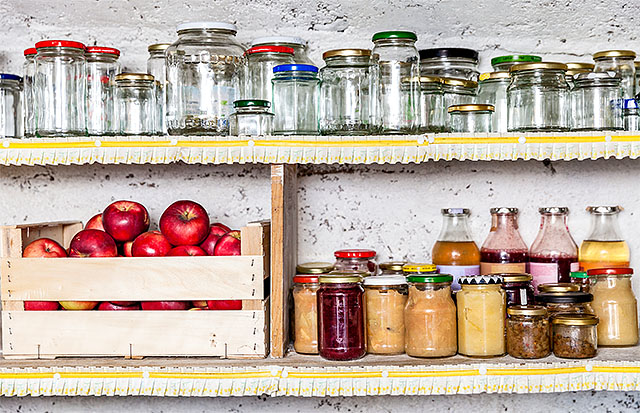Access to food during a crisis
Here are some tips about food that’s good to have at home, how it can be prepared, and how best to store it in case of recurring power cuts or a prolonged power outage.

Photo: Johnér
You need food
If you are healthy, your body can go quite a long time without food; however, your mental faculties deteriorate rapidly if you don't eat. Your capacity to think will decline and you will feel worse. So, make sure you have something to eat! Buy additional portions of items that you usually buy anyways and that have a long shelf life. It’s also good to have access to food that does not require heating or advanced cooking.
Without supplies, there will be food shortages
If there are power cuts or a prolonged power outage, it may be difficult to deliver goods to shops. After just a few days, shelves will be empty. That's why it's a good idea to have food at home, so you can go a week without having to shop.
Cooking without electricity
Most of the equipment in a modern kitchen stops working during a power cut. In the event of a power cut, you can use an alcohol burner or camping stove (storm kitchen) to cook. The cooker must be placed on a flat surface that cannot catch fire. It must also be well ventilated, and you must be able to extinguish a fire. It’s easiest to cook outdoors. An outdoor grill is also good for cooking during power cuts. If you live in an apartment, you can attend a barbecue in a park or courtyard, if there is one near you.
Store food properly
It’s important to store food and groceries properly if your refrigerator and freezer are not working. Otherwise, you can get sick even if you cook or fry your food. Start by eating what's in the refrigerator while it's still cold and the food is fresh. Even if the power cuts out, the freezer will stay cold enough for a couple of days. Open the freezer door as few times as possible and close it again quickly to keep the cold in. If you have a balcony or patio, you can store your food there when it's cold outside.
Don't forget cash!
You may need to carry cash for shopping purposes. In the event of a power cut, neither ATMs nor card payments will work, but many supermarkets accept cash. Take out cash in advance if you can and keep it in a safe place. Calculate what you would need for a week.
Tips about groceries
Prepare in advance so you don't have to buy everything at once if something serious happens. Adapt the advice in the checklists to your specific needs and circumstances. You may be able to share some items with others, such as your neighbours. In times of crisis and war, we all need to help one another. But this is also true in everyday life.
Checklist: Food
You need food that is filling, energy-rich and that can be stored safely at room temperature. Get food that can be prepared quickly, requires very little water, or that can be eaten immediately. Start building up your emergency storage by simply buying one or two additional items when doing your regular shopping.
- Non-perishables: Grains, cereal, pasta, rice, couscous, instant mashed potatoes, milk powder, tortillas, crispbread, crackers, salt, and spices.
- Tinned goods: Tomatoes, vegetables, fruit, and ready-to-eat meals.
- High-protein: Dried or tinned meat and fish, chickpeas, beans, lentils, and cheese in a tube.
- High-fat: Cooking oil, pesto, sun-dried tomatoes in oil, tapenade, peanut butter, nuts and seeds.
- Energy boosts: Fruit custard, jam, chocolate, honey, protein bars, and dried fruit.
- Drinks: Coffee, tea, hot chocolate mix, blueberry and rosehip soup, juice, or milk. Ultra-high temperature (UHT) drinks can be stored at room temperature and have a long shelf life as long as they are unopened.
- Food for children: Gruel, infant formula, oatmeal, and baby food.
Checklist: Preparedness on a tight budget
- Learn to cook from scratch. Cabbage, potatoes, onions and carrots are inexpensive.
- Practise cooking every day with what you already have at home.
- Bulk is always less expensive. Can you share with a neighbour?
- Make the most of fruit and berries. Grow edible foods in your garden, on your balcony, or windowsill.
- Examples of affordable foods are crushed tomatoes, pickled vegetables, lentils, beans, crispbread, and oatmeal.
- Get charcoal to use for outdoor barbecues in your neighbourhood if the power cuts out.
